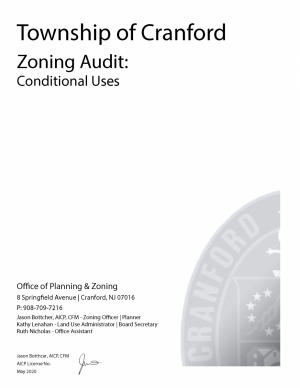Conditional Use Audit - FINAL DRAFT - May 2020
 The purpose of zoning regulations is to apply standards to both building requirements and the types of permitted activities. The Township applies these standards by zoning district in order to ensure that what is built, where it is built, and how it is utilized is not detrimental to the existing character of the neighborhood and the Township nor in conflict with the Township's Master Plan. The "what, where, and how" standards is the most basic means of protecting the Township's look and feel.
The purpose of zoning regulations is to apply standards to both building requirements and the types of permitted activities. The Township applies these standards by zoning district in order to ensure that what is built, where it is built, and how it is utilized is not detrimental to the existing character of the neighborhood and the Township nor in conflict with the Township's Master Plan. The "what, where, and how" standards is the most basic means of protecting the Township's look and feel.
The Township's Use Regulations are codified in §255-36 - Use Regulations. The use regulations define permitted uses, conditional uses, and subsequently, non-permitted uses. The Zoning Ordinance is a permissive ordinance. This means that any uses not specifically defined or specified as permitted or conditional is considered to be non-permitted. Conditional Uses, on the other hand, can be described as being neither permitted nor non-permitted. Conditional Uses exist in between the two and are defined by specific conditional requirements within the Zoning Ordinance.
Conditional uses require, at the very least, approval from the Planning Board if all of the conditions specified by the ordinance are met. If those conditions are not met, approval from the Zoning Board of Adjustment is required. The primary point of conflict related to conditional uses stems from the fact that the Planning Board, assuming an application meets the conditions specified in the Zoning Ordinance, does not have any justification to deny such an application.
The Township also applied Supplemental Use Regulations (§255-37 of the Township Code) which serve to provide additional requirements for certain permitted uses. A permitted use that meets these supplemental requirements can be approved by the Zoning Officer unless otherwise specified. In essense, the difference between the conditional use requirements and the supplemental use regulations and how they are applied is subtle. The primary difference being that a conditional use will require approval from one of the Township's Boards no matter the circumstance.
The purpose of this document is to identify all of the conditional uses and the conditional requirements in the Township. This audit will allow for an examination of how these requirements are applied and whether or not such requirements should remain 'as-is' or if these standards should be reconsidered. Ultimately, this document will serve to:
1. Limit the Township's and the Board's potential exposure to liability concerns;
2. Simplify the administration of conditional uses and supplementary use regulations in the Township;
3. Remove unnecessary bureaucratic burdens on business and property owners.
This plan was completed by the Office of Planning & Zoning, Jason Bottcher, AICP, CFM - Zoning Officer.
Updated June 12, 2020
